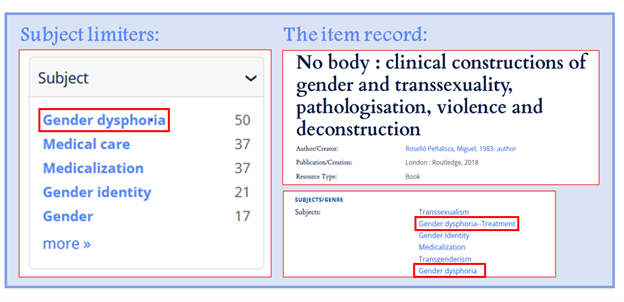 Have you ever wondered how library catalogs, like Emory’s Library Search, are built and maintained? Or how library catalogers decide upon the best terms to describe the books, articles, and other media that you use for your research? This process might seem far removed from your own work; however, it directly impacts the research process.
Have you ever wondered how library catalogs, like Emory’s Library Search, are built and maintained? Or how library catalogers decide upon the best terms to describe the books, articles, and other media that you use for your research? This process might seem far removed from your own work; however, it directly impacts the research process.
What we are doing
Recently, Emory Libraries has undertaken a project to revise the display of subject headings in the catalog that have been determined to contain harmful or offensive language.
Please help us improve our catalog by making it more inclusive. We are seeking your feedback on our selections of appropriate replacement terms. Read on to learn all about the project and how you can help.
Why we are doing this
Emory is committed to offering inclusive and non-derogatory information in the library catalog, and we are always seeking ways to ensure the language we use is fair, equitable, and representative.
Language and terminology evolve faster than controlled vocabularies and, therefore, can contain outdated headings. As a result, our catalog records may include descriptions we would like to avoid. Not only is such language sometimes inequitable, but its very existence can also actively dissuade users from searching our collections.
Our solution
We have developed a solution that allows us to mask a small number of problematic terms in the catalog and replace them with more updated and sensitive choices. You can see how this works by looking at the subject heading – Gender dysphoria (changed from Gender identity disorder as part of a prototype).
Our solution replaces the subject headings in both the subject limiter and the item record.

The original headings will persist in the system, so users will be able to search by both the old and the updated terms to find a resource. Notably, this project does not replace any language in resource titles, including those that are part of a named series.
To reiterate: We are now seeking feedback on our initial list of potential subject heading changes to implement.
A snapshot of some of our proposed changes
- The word “people” will be added to several subject headings. For example – African American gays will become African American gay people.
- The term “sexual minorities” will be replaced with LGBTQ+ people. For example – African American sexual minorities will become African American LGBTQ+ people.
- The heading East Indians will be changed to Indians (India).
- The heading East Indian Americans will be changed to Indian Americans.
Challenges
This process is almost as complicated as it is important. Some headings we are currently discussing have already been updated by the Library of Congress in slightly dissimilar ways to what is proposed on our list or are featured differently in other vocabulary lists used by catalogers.
For example, the Library of Congress has changed the heading Child slaves to Enslaved children, but other instances of the word “slave” – such as “Slave rebellions,” “Slave trade,” or “Slave traders” have not been updated. This is due to the long history of the term both within and outside the US as well as with the continued use of the existing language among scholars.
Some of these inconsistencies may seem minor, but we believe that both accuracy and equity are extremely important qualities of our catalog.
Some technical stuff: Masking vs. replacing subject headings
While it is an admittedly slow process, the Library of Congress does update subject headings regularly. Once in the official pipeline, these changes take place automatically in our catalog – updating old headings with new. Because we do not want to interfere with any future automated changes, we decided to mask the offensive subject headings in the catalog rather than replace them. This ensures that the problematic terms are hidden and allows us to retain the old headings behind the scenes. When official changes take place, these old headings will be updated as needed. Crucially, though, only the terms we decide we want will display.
Your part
We want to engage with the University population as much as possible and are exploring ways to foster this interaction. In addition to seeking advice from the community to provide knowledgeable and equitable input regarding our proposed terms, we are also developing systems to periodically review and update our list of subject heading changes. It is important to note that this is a work in progress. Some headings are very fluid, and others will evolve. Therefore, thoughtful changes need to be discussed and implemented periodically.
Ultimately, our aim is to create a fair, equitable, and representative library catalog.
Please look at our list and consider completing our feedback survey as your comfort level and expertise allow. In addition, you can report anything in the catalog that seems offensive, harmful, or misrepresented, via this form.
For more additional details or questions about this project you can contact Sofia Slutskaya, Tricia Clayton, or your subject librarian.
—Tara Kunesh, Woodruff Library Resource Description Team
